tbh i'd rather have steels.
30 minutes isn't much time to learn the roads, snow and ice is unpredictable, you need to learn how to cope with a sudden loss of traction. I probably covered 1,000 miles over winter and I still wouldn't say I knew full well how long it'd take to come to a complete halt. I also didn't have ABS or traction control to fall back onto, I purely went by feel and total engine brake.
But I still feel I'd benefit from some more time on unpredictable road surfaces because I still found myself coming across "interest" being in the UK we just don't get the wheel time required to really have the skill to drive with any pace on in the snow.
This, especially in the winter. With all of the salt around and the high probability of mounting the curb, you want something to take the impact and keep on going, rather than bending out of shape. I've kept the steelies from my van just to use in the winter for this reason. Keeping the alloys for the summer.
Why all the hassle for swapping wheels bla bla bla, just buy new decent tyres wich last longer ...
Because I live in the UK, our roads are bad enough in towns and cities, living out in the sticks, it is like driving on a teenagers face. Plus as I've mentioned salt ruins alloys as does clipping the curb. So I'd rather take the 10 minutes to change alloys to steelies when the gritters come out to play. Plus on steelies the van sits slightly higher (Ford design for you, even the speedo was set-up for the smaller car wheels) which is a great advantage when you have 1 mile of dirt road to negotiate before getting onto the much rougher sealed roads. I'll have to take a few photos one day, but if you imagine Soviet Russian quality. That is about accurate.
[edit: For the lulz.

Because I can.]
HAH that looks kinda cool. Definately better than the factory rims.
New Ride S13 silvia 

There is one wheel in the wrong place. You can't drive like that!

With all the talk about summer/winter tires you guys have, what are you considering summer tires? What kind of compounds/mileage/traction/wear/bad weather performance, etc do you get?
Over here we have our choice of basically 3 types of tires (cars).
Summer or performance tires. These are generally expensive, gives fantastic traction on dry surface and wear horribly. My car had summer performance tires on it when I bought it and they last a whole 10,000 miles. That's less than a year for $279 each (some are cheaper and some are more expensive, but they are generally much more expensive than all-seasons.) Summer tires also are terrible in the rain. For the entire time I had these tires on, driving in the rain was basically like waterskiing. I had to drive horribly slow on my way to work holding up cars and cars of traffic behind me because I couldn't do more than 40 mph or my car would hydroplane on the smallest amount of water on the roads.
All-seasons are what 95% of the people put on their cars. They aren't the best for snow, but driving in the rain is no different than driving in dry conditions. These last anywhere from 35,000 miles to up to 80,000 miles depending on the particular tire (based mostly on how much you pay.)
Pure snow tires. Obviously these are for snow. I was amazed at my first experience with a small car and snow tires coming from 15 years of driving Toyota 4WD pickup trucks. My Honda Civic with the snow tires did every bit as well in any kind of snow (over 3 feet in our work parking lot, not the massive 1-2 cm that you guys have been talking about the last 2 years...) as my 4WD's have done. The compound is very hard and such in warmer weather there is no traction on dry pavement.
So, you guys talk all the time about summer tires, what do you mean by summer tires? Over here, we would have to replace tires yearly if running "summer" tires as they only last 10-15,000 miles.
When you mention winter tires, what do you mean? Where I am, cold weather runs from November through sometimes all the way to May. We also can get heavy snow all through November until about March, but often get hit with the occasional snowstorm in April and even early May (by snowstorm, I'm talking 8 inches or greater.) We would put winter tires on in October and remove in April. So we could get 6 months worth of running. Outside of October through April, the temperatures are too high to run the hard compound winter tires.
So, when you talk summer tires, are they summer tires as I've described, soft compound dry traction only? Or are you talking all-season tires which have longevity and wet traction that summer tires over here are severely lacking?
Average tire cost here is roughly $100-150 per tire for all season and roughly will last on average 40-60,000 miles, which is average of about 3-5 years. Summer tires are generally above the $150 cost, the particular tire that was on my car when purchased was $279 each and as I said, lasted slightly above 10,000 miles.
Tires are the absolute only thing you can do about driving in adverse weather such as snow/ice. You can NOT predict road conditions as conditions are not static everywhere you go. Snow and ice conditions are constantly changing from the air temperature. You can have snow that is as grippy as driving on a dry dirt road and snow that is so slippery you can't accelerate or brake in no matter how "good" of a driver you think you are and how "careful" you brake or how "well" you read road conditions or how slow you drive. Same with ice. I have driven on ice that was no different than driving in the rain, and driven on ice that the car will slide across even if you magically plunked your car down on it at a stand still. There is nothing you yourself can do with your driving about snow/ice driving, but the tire you have does broaden the abilities of your car to brake, accelerate, or stay stopped once you've managed to stop.
And antilock brakes is the worst thing to ever be put on a car in my opinion. Traction control has enabled me to manage barely through last year's winter getting to and from work with the crappy "summer" tires, but antilock brakes have many many times nearly caused me to crash because of the car not allowing me to control and taking it over from me.
Over here we have our choice of basically 3 types of tires (cars).
Summer or performance tires. These are generally expensive, gives fantastic traction on dry surface and wear horribly. My car had summer performance tires on it when I bought it and they last a whole 10,000 miles. That's less than a year for $279 each (some are cheaper and some are more expensive, but they are generally much more expensive than all-seasons.) Summer tires also are terrible in the rain. For the entire time I had these tires on, driving in the rain was basically like waterskiing. I had to drive horribly slow on my way to work holding up cars and cars of traffic behind me because I couldn't do more than 40 mph or my car would hydroplane on the smallest amount of water on the roads.
All-seasons are what 95% of the people put on their cars. They aren't the best for snow, but driving in the rain is no different than driving in dry conditions. These last anywhere from 35,000 miles to up to 80,000 miles depending on the particular tire (based mostly on how much you pay.)
Pure snow tires. Obviously these are for snow. I was amazed at my first experience with a small car and snow tires coming from 15 years of driving Toyota 4WD pickup trucks. My Honda Civic with the snow tires did every bit as well in any kind of snow (over 3 feet in our work parking lot, not the massive 1-2 cm that you guys have been talking about the last 2 years...) as my 4WD's have done. The compound is very hard and such in warmer weather there is no traction on dry pavement.
So, you guys talk all the time about summer tires, what do you mean by summer tires? Over here, we would have to replace tires yearly if running "summer" tires as they only last 10-15,000 miles.
When you mention winter tires, what do you mean? Where I am, cold weather runs from November through sometimes all the way to May. We also can get heavy snow all through November until about March, but often get hit with the occasional snowstorm in April and even early May (by snowstorm, I'm talking 8 inches or greater.) We would put winter tires on in October and remove in April. So we could get 6 months worth of running. Outside of October through April, the temperatures are too high to run the hard compound winter tires.
So, when you talk summer tires, are they summer tires as I've described, soft compound dry traction only? Or are you talking all-season tires which have longevity and wet traction that summer tires over here are severely lacking?
Average tire cost here is roughly $100-150 per tire for all season and roughly will last on average 40-60,000 miles, which is average of about 3-5 years. Summer tires are generally above the $150 cost, the particular tire that was on my car when purchased was $279 each and as I said, lasted slightly above 10,000 miles.
Tires are the absolute only thing you can do about driving in adverse weather such as snow/ice. You can NOT predict road conditions as conditions are not static everywhere you go. Snow and ice conditions are constantly changing from the air temperature. You can have snow that is as grippy as driving on a dry dirt road and snow that is so slippery you can't accelerate or brake in no matter how "good" of a driver you think you are and how "careful" you brake or how "well" you read road conditions or how slow you drive. Same with ice. I have driven on ice that was no different than driving in the rain, and driven on ice that the car will slide across even if you magically plunked your car down on it at a stand still. There is nothing you yourself can do with your driving about snow/ice driving, but the tire you have does broaden the abilities of your car to brake, accelerate, or stay stopped once you've managed to stop.
And antilock brakes is the worst thing to ever be put on a car in my opinion. Traction control has enabled me to manage barely through last year's winter getting to and from work with the crappy "summer" tires, but antilock brakes have many many times nearly caused me to crash because of the car not allowing me to control and taking it over from me.
Pft...
Anti-lock brakes are for people who aren't running ancient crapwagons. Speaking of which, I plan on putting up my crapwagon this weekend.
Anti-lock brakes are for people who aren't running ancient crapwagons. Speaking of which, I plan on putting up my crapwagon this weekend.
Here's how it goes in Finland atleast.
Summer:

Winter:

All season:

I currenly have all seasons on my Lexus, planning to drive them until they are fully worn, then get a proper separate summer/winter set. All seasons wear so damn fast during summer, I have a feeling I'll be driving on slicks by the time winter arrives.
Summer:

Winter:

All season:

I currenly have all seasons on my Lexus, planning to drive them until they are fully worn, then get a proper separate summer/winter set. All seasons wear so damn fast during summer, I have a feeling I'll be driving on slicks by the time winter arrives.
Well, if this is going to turn into a tire discussion...
I've got $108/ea Dunlop Direzza Z1 tires for the summer (205/50r15):

And cheap $65/ea Firestone Winterforce for the winter (195/60r15):
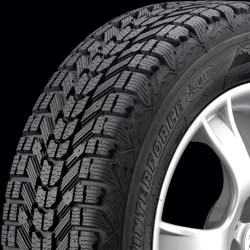
I only have I'd say at most 1500mi on the dunlops and i'm not sure how much on the firestones. Also, my summer tires are great in the rain
I've got $108/ea Dunlop Direzza Z1 tires for the summer (205/50r15):

And cheap $65/ea Firestone Winterforce for the winter (195/60r15):

I only have I'd say at most 1500mi on the dunlops and i'm not sure how much on the firestones. Also, my summer tires are great in the rain

35-80k on a set of tires is pretty much unheard of over here. At most, you might get 25k out of the front tyres driving like a nun...
I have no problems with my Summer tyres in the rain, sure I've got a bit less grip but they still deliver loads and loads of grip.
This would be my definition of "summer" tyres (in fact I'm running Falken FK452's up front on the ZT).
I get through a pair of front tyres in about 12k (heavy car + FWD), and rears 25+k (the last set lasted that long before they got a puncture).
The FK452's cost me ~£100 + fitting (~£10) each in 225/45/18
And what I use at the back:

Vredestein Ultrac Sessanta's - usually ~£125 each + fitting (although I only paid £110 for the pair)
In the UK tyres are usually described as "all season" but are really summer tyres for comparison. Nobody really uses winter tyres at all.
Cant remember what my winters are (Yokohama something), but their just studless mud/snow tyres.
Performance tyres tend to be semi-slicks and rubbish on anything but bone dry roads.
I have Toyo Proxes for the summer, mounted to my alloys (195/50/15), they are very capable in the wet and fantastic in the dry. No comment on longevity yet because I've only put 3k through them, but from when I got them to now, no real signs of wear.
For winter I use a set of snow biased all seasons, they are mounted to a set of steelies (165/80/13). To be fair they were rather good in the summer, but after getting slightly stuck pointing uphill (16% covered in ice) I tore through the front tyres and they started to aquaplane like a bastard. But the steel wheels took a hell of a beating due to pot holes and what have you, if I'd have been wearing the alloys at the time would result in a badly bend wheel.
Although I had about 4-5ft of snow from late November to mid February, the van was out of its depths purely because having an open diff meant I kept spinning up the inside wheel, so I rocked the truck in that window, which had standard all seasons on.
We don't get the snow fall (normally) in the UK to require dedicated snow tyres with studs and what have you. Which is why it catches is off guard, but my rule of thumb is when the gritters are out use steelies.
Although the last two years have been exceptionally bad up here, I doubt it'll be the norm. If it is, I'll have to get some proper snow tyres, but for now all seasons do the job. It is mostly about getting off the alloys and putting on something that can take the abuse of salt and withstand hitting hidden potholes and the like.
Erm, the Omega got a new set of budget tyres on all four corners when it entered the family in September 2004, when I got rid last September it still had those four budget tyres and it was putting down an average of 9 maybe 10k a year. Admittedly the rear two were down the to TWI so would have needed replacing soon.
I have Toyo Proxes for the summer, mounted to my alloys (195/50/15), they are very capable in the wet and fantastic in the dry. No comment on longevity yet because I've only put 3k through them, but from when I got them to now, no real signs of wear.
For winter I use a set of snow biased all seasons, they are mounted to a set of steelies (165/80/13). To be fair they were rather good in the summer, but after getting slightly stuck pointing uphill (16% covered in ice) I tore through the front tyres and they started to aquaplane like a bastard. But the steel wheels took a hell of a beating due to pot holes and what have you, if I'd have been wearing the alloys at the time would result in a badly bend wheel.
Although I had about 4-5ft of snow from late November to mid February, the van was out of its depths purely because having an open diff meant I kept spinning up the inside wheel, so I rocked the truck in that window, which had standard all seasons on.
We don't get the snow fall (normally) in the UK to require dedicated snow tyres with studs and what have you. Which is why it catches is off guard, but my rule of thumb is when the gritters are out use steelies.
Although the last two years have been exceptionally bad up here, I doubt it'll be the norm. If it is, I'll have to get some proper snow tyres, but for now all seasons do the job. It is mostly about getting off the alloys and putting on something that can take the abuse of salt and withstand hitting hidden potholes and the like.
Erm, the Omega got a new set of budget tyres on all four corners when it entered the family in September 2004, when I got rid last September it still had those four budget tyres and it was putting down an average of 9 maybe 10k a year. Admittedly the rear two were down the to TWI so would have needed replacing soon.
Got bored with red and black wheels, so decided to grab a few rattle cans and see what i could come up with, actually hasnt come out too bad really.
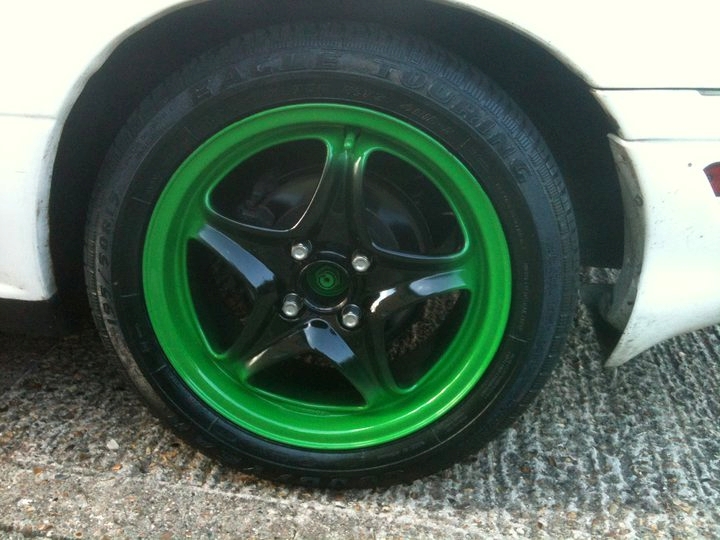
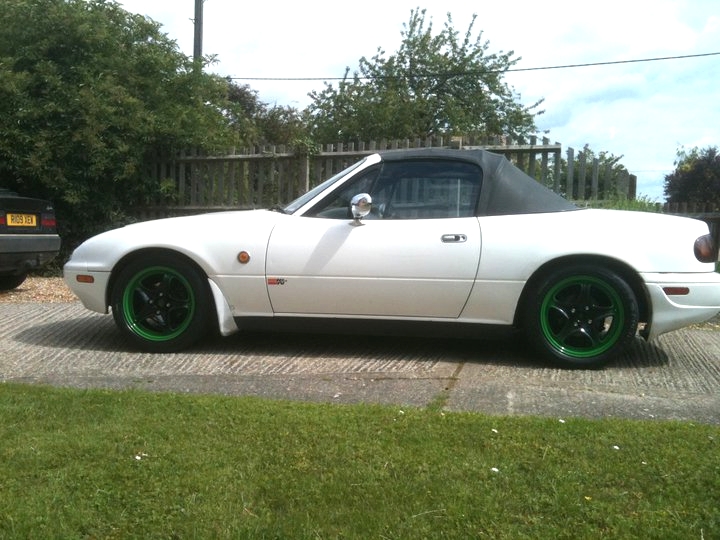
I like it!
I like it!

Why didn't you mask the lip off?
Would have looked so much better.
Would have looked so much better.
Gives it a nice bit of contrast Dan. Masking does take a lot of time to get perfect, but it's worth it. These are the wheels I painted for my MR2 at the beginning of last season.
From this:
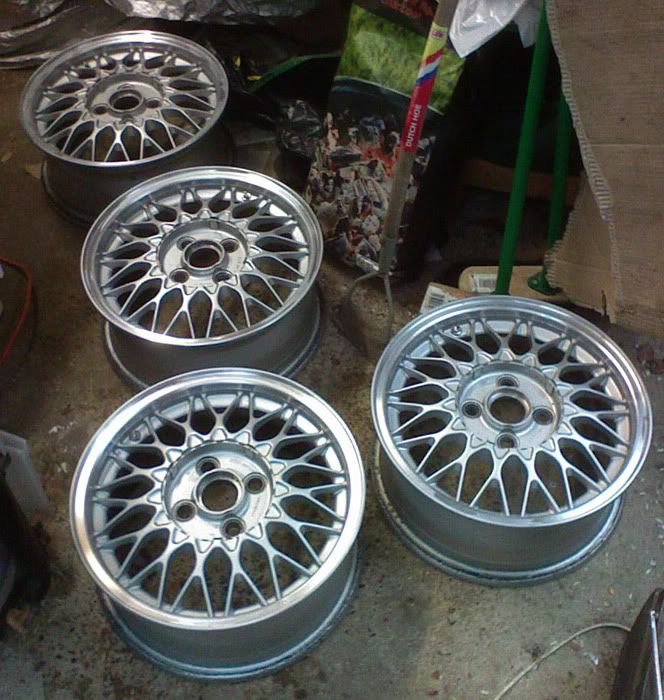
To this:
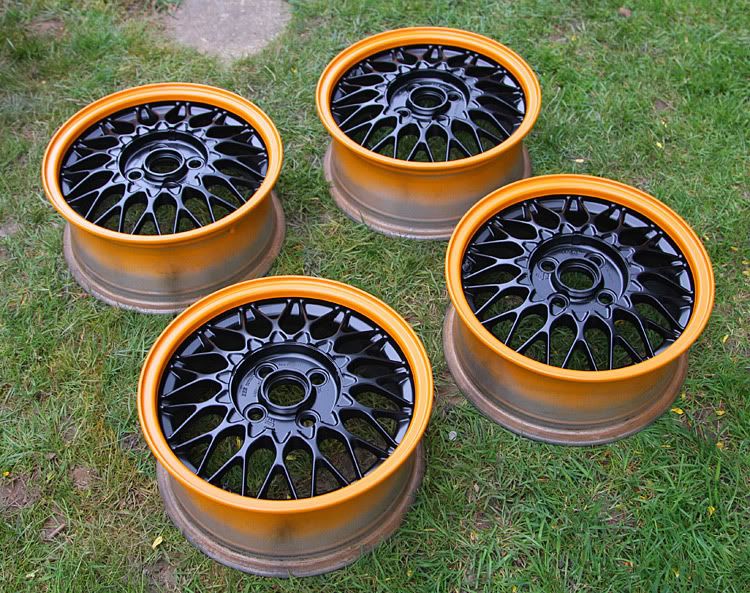
From this:

To this:

Gorgeous.
oh this happened yesterday.

Before anyone has some hater comment; no I'm sorry I don't have a racing seat yet, but that and a roll cage among stronger sway bars are next on my list.
I just happened to have a stack of amazon points so I got the harness for like $30
and the illest sticker was free because I used our plotter at work :P
oh this happened yesterday.

Before anyone has some hater comment; no I'm sorry I don't have a racing seat yet, but that and a roll cage among stronger sway bars are next on my list.
I just happened to have a stack of amazon points so I got the harness for like $30
and the illest sticker was free because I used our plotter at work :P
no passenger seat gives 5 extra virtual horsepower !
Post some pictures of your race AW11 :P
Personally, i'd never install a harness instead of a standard seatbelt. Just for the comfort 
On another note..
i've been asked to do some donut/drifting scenes in a movie they are shooting this year... i'm excited

On another note..
i've been asked to do some donut/drifting scenes in a movie they are shooting this year... i'm excited

Is it at least a 5 point harness? Don't use them until you get a proper seat. Also, cage in a pure streetcar? For realz?
I was thinking the same. Can't see the reason of having a cage, until it's gonna be converted into a trackday car or something? Don't think it's the case, so why?
Add stiffness..
What material will it be, or just a showcage to get to "da scene"
What material will it be, or just a showcage to get to "da scene"
I know what a cage does. A cage in a streetcar will also kill you and crush your skull when not using SFI/FIA rated padding, a proper seat and a properly mounted and tightened harness.
And don't forget a proper brain bucket.
This is also why you could never insure a street car in the UK if you have a roll cage. Every single insurer will refuse to cover you (or charge extreme amounts), you could choose to not tell them, but your policy will be void in a shunt.
Of course in the US, anything that saves a car over human life will bring down insurance costs.
This thread is closed
Post your Car!
(15536 posts, closed, started )
FGED GREDG RDFGDR GSFDG